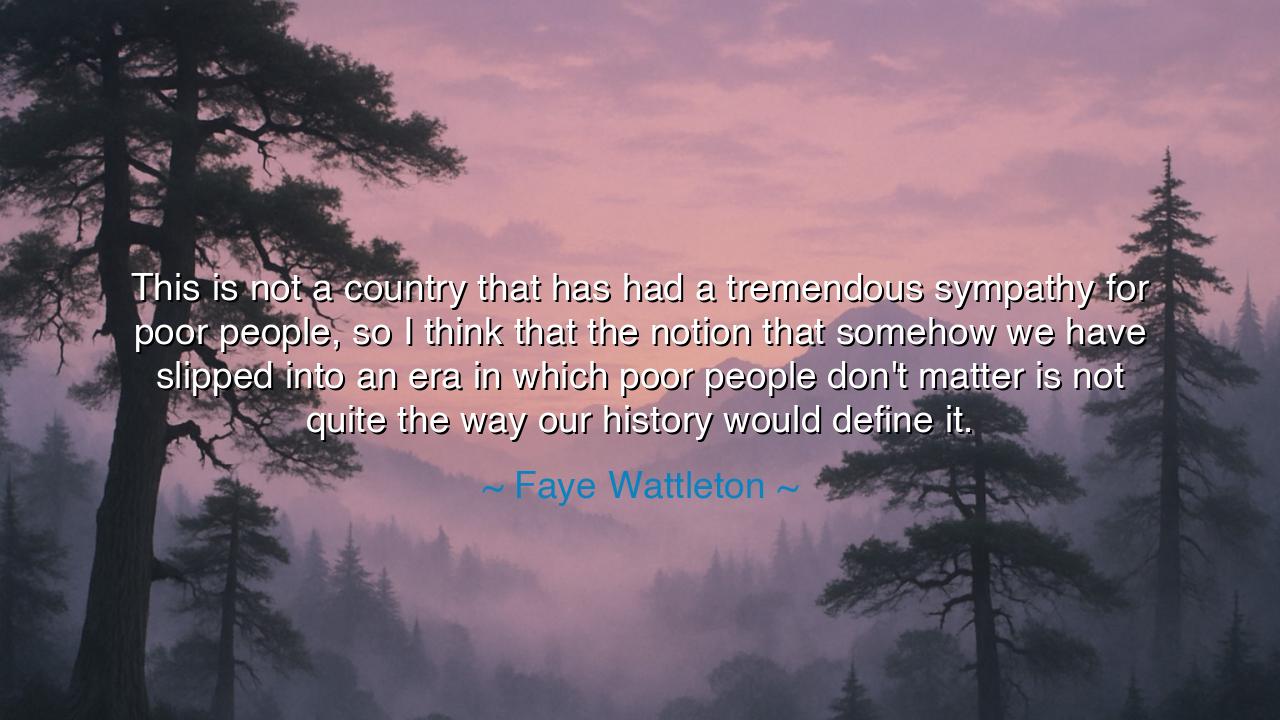
This is not a country that has had a tremendous sympathy for
This is not a country that has had a tremendous sympathy for poor people, so I think that the notion that somehow we have slipped into an era in which poor people don't matter is not quite the way our history would define it.






Hear the words of Faye Wattleton, a voice of courage and conviction, who declared: “This is not a country that has had a tremendous sympathy for poor people, so I think that the notion that somehow we have slipped into an era in which poor people don’t matter is not quite the way our history would define it.” In these words, she pierces the veil of illusion, reminding us that neglect of the poor is not a sudden corruption of the present age, but a wound woven deeply into the fabric of the nation’s story.
When Wattleton speaks of sympathy, she reminds us that compassion toward the poor has too often been thin, conditional, or fleeting. From the earliest days, wealth and power were celebrated, while the struggles of the lowly were met with indifference or disdain. And yet, she cautions against imagining that our era alone has birthed this disregard. Rather, she calls us to look backward and recognize a continuity: that across generations, the poor have often borne the weight of society with little acknowledgment, their suffering treated as background noise in the march of progress.
The origin of her words lies in her life’s work as an advocate for women, families, and the marginalized. As the first African-American woman to lead Planned Parenthood, she bore witness to the intersection of poverty and neglect, especially in communities that carried the double burden of discrimination and deprivation. She spoke not as one detached from the struggle, but as one who lived among it, and who recognized that society’s coldness toward the poor was no sudden storm, but a long and unbroken winter.
History itself confirms her vision. Consider the Industrial Revolution, when children labored in factories, their lives consumed by machines while profits flowed upward. Or the Dust Bowl of the 1930s, when migrant families were scorned as burdens even as they fought to survive on barren land. Even in the building of America’s great wealth, the poor often stood invisible, their sweat forming the mortar of prosperity. Wattleton’s insight reminds us that the struggle of the poor has never been at the center of national sympathy, even as their labor sustained the nation’s rise.
The deeper meaning of her words is this: to lament that the poor are disregarded “now” is to miss the truth that they have been disregarded always. If we believe the present to be uniquely cruel, we risk forgetting that neglect has been constant, and thus we fail to see the long arc of injustice. Wattleton does not absolve the present; rather, she calls us to recognize that our age has inherited this blindness and must break from it deliberately, lest we repeat the patterns of the past.
Beloved listener, take this wisdom into your life. Do not be lulled into thinking neglect of the poor is natural, nor excuse it as merely the spirit of the times. See it instead as an ancient failing that cries out to be undone. Let not your sympathy be shallow or passing, but transform it into enduring care and concrete action. Recognize that history has left the poor in the margins, and it is for us to write them into the center.
Therefore, let us learn the lesson of Wattleton’s words: to honor the poor not as burdens, but as brothers and sisters; not as forgotten shadows, but as living souls whose dignity demands respect. Let us not be deceived into thinking this disregard is new, but let us resolve that it shall not endure into the future.
Thus her words endure as a summons: that the neglect of the poor is a scar written across history, but one that we have the power to heal. If our ancestors lacked sympathy, let our generation be different. Let us make compassion not a passing sentiment, but the cornerstone of justice, so that the story of tomorrow will not mirror the failings of the past.






AAdministratorAdministrator
Welcome, honored guests. Please leave a comment, we will respond soon